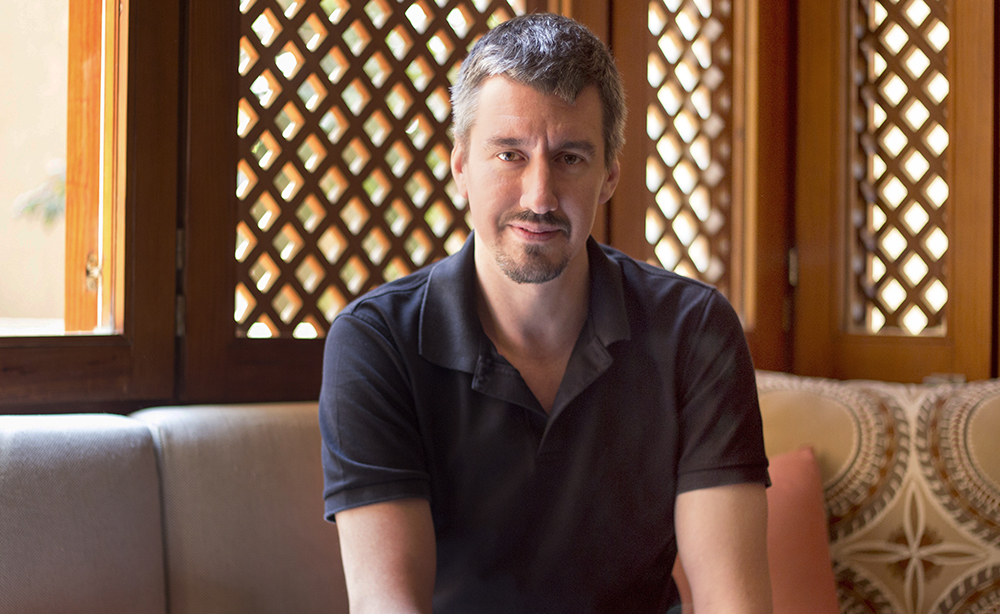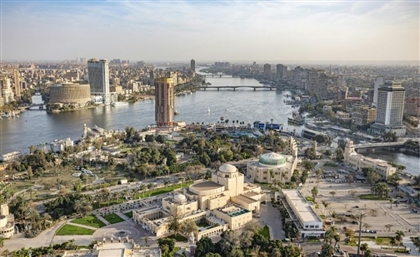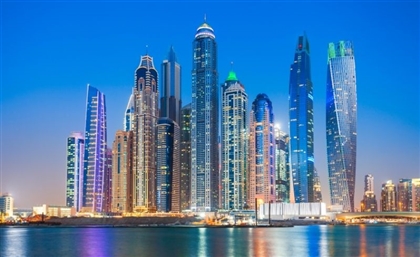How This Entrepreneur Disrupted a 70-year-old Organisation to Create UNICEF’s Fund For Startups
He kicked off UNICEF's first ever startup fund, a $11.2 million innovation fund to connect tech and humanitarian aid, and is now offering up to $100,000 investments for MENA startups. In an exclusive interview, Chris Fabian explains how tech can help humanity - while making money.

His legs are often tickling; his hands fidgeting, his mind capturing a plethora of notions, concepts and connections impossible for the mind the grasp. “Sometimes, I look at the time and my mind unwittingly does math with the numbers,” he says as we approach the American University in Cairo, which saw him graduate in Philosophy during his 7-year-long residence in Egypt.
Christopher Fabian is one of those people who are too eager, too restless, too bold and unruly to stand by idly and not help the world’s 7 billion people connect with one another to solve the tragedies humanity has managed to inflict on its planet. Perhaps that’s why this serial entrepreneur, who was named one of TIME magazine’s 100 most influential people, decided to break up with bureaucracy and tradition to entirely transform one of the United Nations’ largest organisations: UNICEF.
Since 2008, when he spearheaded the launch of he UNICEF's Office of Innovation, he’s been nurturing unfathomable programmes using tech to transform the face of humanitarian aid, crafting programmes as innovative as they are mindblowing, such as the UNICEF Drone Corridor in Malawi, which uses drones to collect blood samples from children.
To this day, the Innovation Fund has invested over $2.1 million in 35 projects across 28 countries – mainly in open source tech companies – and last year, it created the UNICEF Ventures fund for early-stage startups using “frontier technology” such as Drones, UAVs, data science and machine learning - a fund he is now bringing to Egypt and the MENA region for startups to apply.
A New Yorker by accent but a global citizen at heart – he’s lived in countless countries, from Ireland, to Lebanon, to Tanzania – the 37-year-old entrepreneur is the son of a Polish refugee – though the experience was never a trigger to his passion for changemaking. “I never thought of that until recently, when while looking through old photos we found the refugee registration card and literally thought ‘Oh! well, that looks exactly like the ones in Europe now.’ And that’s when I made the connection. I am not in this because of some great empathy for humanity, I'm in it because I think these are problems that need to be solved. So for me it was really the other way around; I thought ‘Oh, huh... I suppose deep in my psychology that’s buried somewhere.'”
It’s past midday as we approach the AUC, where Fabian is going to meet some of Egypt’s gamechanging startups, while opening up to $100,000 in investments to startups working on AI, blockchain, bots, 3D printing, or data science, on one condition: their innovation has to be open source. So we get down to business to find out more.
You often say that the innovations that will fix the asymmetry of the world come from developing countries. Why do you think that?
I think every piece of research we have shows that the best solutions come from places with the biggest constraints. If you’re in Silicon Valley right now, you’re probably making an app to find a better restaurant than your friends more quickly – something that’s essentially meaningless in the human spectrum. So I think that as we see places with great constraints, we’re able to see this undercurrent of creativity because of those constraints.
I also think that places where you have big asymmetry, you have the contrast turned up a lot, so it allows you to see things for what they are. So when you’re in Burundi; you’re looking at a country of 18 million people – Like 40, 50 percent of them are under 25. And in the next 15-20 years, you’re going to have 40 million people and there are no jobs for any of them. So that shows us, forces us, to see a future of joblessness, which is going to be true everywhere but again wealth masks that. I think that gives us a little bit of a lens into the future.
Now if we agree with the - quite arguable - premise that terrorism is one of the main problems the Middle East has, how could you imagine startups solving that?
I don’t think startups by themselves can solve anything. I think a group of people working on a specific project, in a specific place rarely will solve a global problem, however connecting those people to other people working on the same issue, on the same project in other places can make a solution appear. And I also think that the issues we see with increased violence in the world and increased disparity are obviously connected, when you have lack of opportunities and lack of choices; you have lack of freedom and lack of dignity and that’s not a place that’s good for anybody to be in.
There’s no solution to lack to dignity, but if you look at the root causes of that; it’s the ability to access information, the ability to have some sense of opportunity in your life, and the ability to choose among several opportunities… And I think if you look at that; can a startup solve that? No. Does creating an entrepreneurial ecosystem give you opportunity? No. Because those are all sort of second level things, but what they can do is help balance some of that unfairness. So I think it’s not the startups, it’s the language of technology and of change, and business that allows us to negotiate what’s really difficult in the next 20 years for humanity.

Christopher Fabian during a talk at Cairo's Greek Campus.
Why do you believe supporting startups is important then?
Startups can provoke industry to change; a startup can show big industry players whether it’s a Facebook, or 10 cents, and an Amazon and Ali Baba... all these big, big, big multi-billion dollar company startups can show them a new way. And if we as UNICEF are coming here and saying “do this for kids,” that kind of gets boring very quickly. If you show a startup is making a new space in the market that is really interesting to those big companies; they’ll change, they’ll put some research on it, they’ll do some work on it; it’s a provocation to bigger players to get them to shift the way that they’re doing their work.
In Egypt, entrepreneurship is only available to a privileged, educated minority. How can the rest be involved and in tune as well in this change?
I think that trying to say entrepreneurship can solve social problems is forcing a mismatch between things that are just different parts of the system. We as humanity need to solve human problems; entrepreneurs need to solve efficiency problems, programmers and engineers want to solve programming problems, artists want to solve aesthetic problems; you can put those people together and they can create new things. But forcing them solve for each other doesn’t always work.
So, going back to the fund; what did it take to create it - and to disrupt the organisation?
I think it literally took the same as creating a startup. And again, it’s not me. I started this team with Erica Coachee in 2008; I had just moved from Tanzania to New York and we started the team. I think it takes the same thing any startup takes, which is stupidity and craziness, and an ability to run for 2 or 3 years and fail all the time. Nothing worked! But at some point after that 2 years, 3 years, 4 years... something starts to work. And I think it’s the same as the companies.
You fund companies for up to $100,000 with no equity, but you require them to be open source. How do you think you can attract entrepreneurs?
So the funny thing is that I bet in two years or three that the open source thing will be unimportant, I just think that it's going to be gone from the discourse. So what we do is we provide from $50,000 to $100,000 of equity-free capital in return for an ability to guide the technology development of a company, which is exactly what a normal VC does. The way that we’re guiding it is through the technology itself rather than through a board, which I think is much more interesting.
In essence, equity allows to take a return, and what we are getting is value back from our companies. So if you just said for a minute “I don’t care about money,” if we said money is a fake construct - which it is - and what we care about is creating a value, then our hypothesis and the regular VC hypothesis are exactly the same: we’re putting in inputs, having a think, and then we’re creating a value out of that. And I think as we get to a world where money is going to mean a very different thing, our proposition will be equally valid to the “Oh, I just want to get some money back.”
So how can startups make money with open source?
I think you create money by creating value. And if you’re a company that can create value more quickly than your competitors as a startup, you can get money. It’s taken for granted now that any tech startup that’s like an app will operate at a loss for the first bunch of years. I mean, look at how much Uber is bleeding money. But, they’re creating value, and that value is going to get them more money. So open source allows you to collaborate better, faster and with more people. So if you can do that and if you’re smart, you actually catch a wave, rather than fighting the ocean. So if you can do that, you can get that second or third round funding much more quickly than your competitors.
So I actually think that the path to a second round of investment or acquisition these days is more about speed than about core IP; unless you’re in pharmaceuticals or maybe some advanced space research. The intellectual property itself is not the differentiator; it’s your speed, your speed to market and your speed of user growth, so if you can optimise those you can then get more value and more money. So the question is, how do you optimise those? I think by collaborating, especially across markets where you don’t have direct competition, you can get that speed faster, you can create more velocity.
If you own a startup in the MENA region and want to apply for the fund, visit UNICEF's Innovation Fund.
Photos by @MO4Network's #MO4Productions.
Photographer: Mahmoud Saleh.
- Previous Article Bassita: Click Funding for a Better Egypt
- Next Article New App Lets You Book A 'Vespa' For Your Next Ride






















